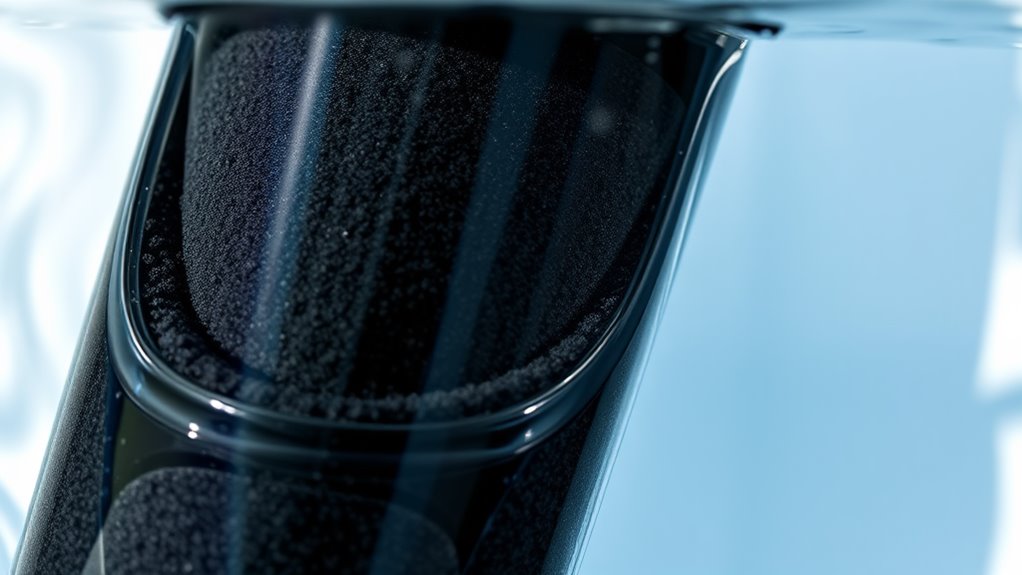What Is an Activated Carbon Water Filter and How Does It Work?
Curious about how activated carbon water filters purify water and enhance taste? Discover the secrets behind their powerful adsorption capabilities.

An activated carbon water filter utilizes the adsorption properties of activated carbon to purify water. It effectively removes contaminants like chlorine, volatile organic compounds (VOCs), and even some heavy metals through its porous structure, which traps impurities. You'll find that both granular activated carbon and carbon block filters offer versatile options for various applications. This cost-effective method not only improves water taste and odor but also guarantees safety. Learn more about the different types and benefits these filters provide.
Activated carbon water filters are an effective solution for purifying water by removing a variety of contaminants. These filters are specifically designed to enhance water quality by utilizing activated carbon, a material derived from organic substances like coconut shells or coal. The activation process increases the surface area of the carbon, enabling it to trap impurities through a mechanism known as adsorption. This process is essential as it allows contaminants to be drawn into the filter's microscopic pores, effectively cleaning the water you consume.
The porous structure of activated carbon is a key factor in its efficiency. During activation, numerous small pores are created, which greatly boosts the filter's ability to capture a wide range of impurities. When water passes through the activated carbon, intermolecular forces facilitate the adsorption process, drawing contaminants such as chlorine and volatile organic compounds (VOCs) into the pores where they're held. This filtration method not only removes harmful substances but also improves the taste and odor of the water, enhancing its overall aesthetic quality.
The porous structure of activated carbon enhances filtration, effectively capturing impurities while improving water taste and odor.
You'll find that activated carbon filters come in various forms, including Granular Activated Carbon (GAC) filters and carbon block filters. GAC filters consist of loose granules that provide a larger surface area for adsorption, making them versatile and cost-effective. On the other hand, carbon block filters are composed of compressed carbon, offering a compact alternative that retains the benefits of GAC. However, once the carbon in block filters has reached its maximum adsorption capacity, it typically can't be reactivated, which is a limitation to take into account.
When it comes to the contaminants that activated carbon filters can effectively remove, VOCs are among the most notable due to their molecular characteristics. Chlorine and chloramines are also reduced considerably, addressing both taste and odor issues while minimizing harmful byproducts. While activated carbon can remove some heavy metals, the effectiveness can vary, necessitating further treatment in certain situations. Impressively, these filters can also eliminate up to 99% of suspended solids, greatly improving water clarity and safety. Activated carbon filters can remove contaminants such as PFOS, pharmaceuticals, and pesticides, making them a reliable choice for water purification.
One of the primary benefits of using activated carbon water filters lies in their cost-effectiveness. They're generally affordable to purchase and maintain, making them accessible for most households. Installation and replacement processes are straightforward, allowing you to easily integrate them into your water filtration system without extensive technical knowledge.
This flexibility means that activated carbon filters can be used in a range of applications, from home systems to industrial setups.
Conclusion
To summarize, an activated carbon water filter effectively removes impurities and contaminants, enhancing water quality through adsorption. For instance, imagine a household using such a filter; after installing it, they notice a significant reduction in chlorine taste and odor, improving their drinking water experience. This practical application highlights how activated carbon filters not only provide cleaner water but also contribute to better health and satisfaction. Ultimately, choosing an activated carbon water filter can be a smart investment for any home.








